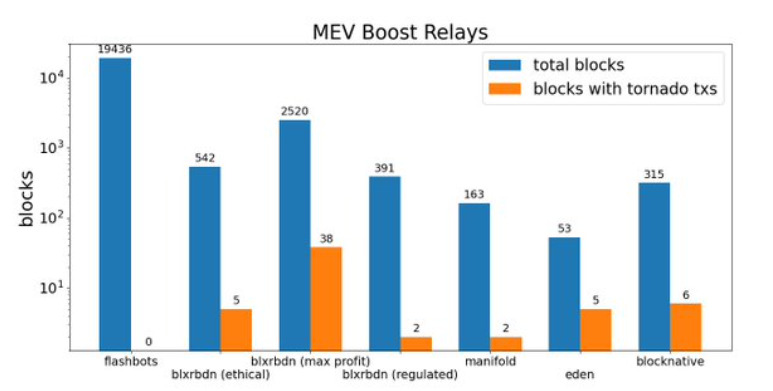
Ethereum’s (ETH) transition to a Proof of Stake (PoS) model continues to undergo scrutiny, with Lachlan Feeney, the CEO of Labrys, raising issues over censorship on the Ethereum network, highlighting that 45% of validators comply with U.S. sanctions.
45% of ETH Validators in Compliance with U.S. Sanctions
In a recent interview with Cointelegraph, Lachlan Feeney, the CEO of blockchain development agency Labrys, asserted that validators are contributing to censorship within the Ethereum network by running Flashbots’ software.
Sponsored
Feeney explained that the MEV-Boost relays used by ETH validators are regulated businesses, oftentimes being U.S.-based. He went on to underline that, contrary to the previous reports of 25%, as many as approximately 45% of ETH validators use the tool.
MEV-Boost relays are centralized entities dedicated to efficient maximal extractable value (MEV) extraction. As a result, MEV-Boost relays are required to comply with sanctions by the Office of Foreign Assets Control (OFAC).
Ethereum’s Censorship in Question
Due to their compliance with with OFAC sanctions, Feeney believes that validators could therefore also be “forced by regulation to basically discard any blocks with any of these transactions in them.”
Feeney also claims that such events have already occurred, with MEV-Boost relays already “censoring certain transactions in the blocks that they build, particularly transactions from Tornado Cash.”
Sponsored
On September 28th, Toni Wahrstätter, an Ethereum researcher, published research confirming Feeney’s assertions. According to the publication, of the 19,436 blocks verified by the Flashbots Mev-Boost Relay, none included a Tornado cash transaction.

On the Flipside
- The decentralization of Ethereum has also been brought into question in the wake of the merge, as just two addresses account for more than 45% of Ethereum Validator nodes.
Why You Should Care
Censorship resistance is considered to be one of the main value propositions of blockchains. The report strengthens fears of Ethereum succumbing to the influence of authorities.
Read more about Ethereum decentralization fears:
Is PoS Ethereum More Centralized? Two Platforms Add 42% of Ethereum (ETH) Blocks Post-Merge
Additional concerns have plagued Ethereum lately:
SEC Implies That All Ethereum (ETH) Transactions Fall Under U.S. Jurisdiction
